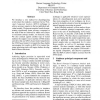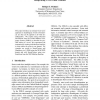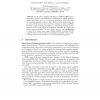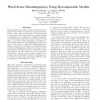154 search results - page 10 / 31 » A New Approach to Word Sense Disambiguation |
ACL
2004
14 years 6 days ago
2004
We introduce a new method for disambiguating word senses that exploits a nonlinear Kernel Principal Component Analysis (KPCA) technique to achieve accuracy superior to the best pu...
ACL
2008
14 years 8 days ago
2008
This paper introduces an unsupervised vector approach to disambiguate words in biomedical text that can be applied to all-word disambiguation. We explore using contextual informat...
CLEF
2008
Springer
14 years 18 days ago
2008
Springer
Abstract. This paper describes our approach to the Question Answering - Word Sense Disambiguation task. This task consists in carrying out Question Answering over a disambiguated d...
CORR
2000
Springer
13 years 10 months ago
2000
Springer
In this paper Schapire and Singer's AdaBoost.MH boosting algorithm is applied to the Word Sense Disambiguation (WSD) problem. Initial experiments on a set of 15 selected polys...
ACL
1994
14 years 4 days ago
1994
Most probabilistic classi ers used for word-sense disambiguationhave either been based on onlyone contextual feature or have used a model that is simply assumed to characterize th...




